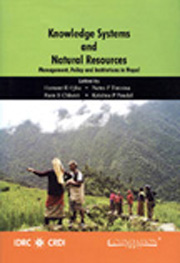Book contents
- Frontmatter
- Contents
- Preface
- Abbreviations
- Glossary of Nepali Words
- 1 Knowledge Systems and Deliberative Interface in Natural Resource Governance: An Overiew
- 2 Agricultural Technology Development in Nepal: Critical Assessment from Knowledge System Perspective
- 3 Contested Knowledge and Reconciliation in Nepal's Community Forestry: A Case of Forest Inventory Policy
- 4 From Grassroots to Policy Deliberation: The Case of Community Forest Users' Federation in Nepal
- 5 From Isolation to Interaction: Increasing Knowledge Interface in Chhattis Mauja Irrigation system in Nepal
- 6 Action Research Experience on Democratising Knowledge in Community Forestry in Nepal
- 7 Culturally Embedded Knowledge in Irrigation: People's Ways of Thriving in a Himalayan Village
- 8 Deliberative Knowledge Interface: Lessons and Policy Implications
- About the Contributors
1 - Knowledge Systems and Deliberative Interface in Natural Resource Governance: An Overiew
Published online by Cambridge University Press: 26 October 2011
- Frontmatter
- Contents
- Preface
- Abbreviations
- Glossary of Nepali Words
- 1 Knowledge Systems and Deliberative Interface in Natural Resource Governance: An Overiew
- 2 Agricultural Technology Development in Nepal: Critical Assessment from Knowledge System Perspective
- 3 Contested Knowledge and Reconciliation in Nepal's Community Forestry: A Case of Forest Inventory Policy
- 4 From Grassroots to Policy Deliberation: The Case of Community Forest Users' Federation in Nepal
- 5 From Isolation to Interaction: Increasing Knowledge Interface in Chhattis Mauja Irrigation system in Nepal
- 6 Action Research Experience on Democratising Knowledge in Community Forestry in Nepal
- 7 Culturally Embedded Knowledge in Irrigation: People's Ways of Thriving in a Himalayan Village
- 8 Deliberative Knowledge Interface: Lessons and Policy Implications
- About the Contributors
Summary
Introduction
This book analyses how diverse knowledge systems operate in the field of natural resource management in Nepal. In order to examine the status of knowledge systems interface and identify the challenges of participatory and deliberative governance of natural resources, the book presents six case studies on forest, agriculture and water governance at different levels – from local community (such as a farmer managed irrigation system) to national research system (such as national agricultural research council) and civil society networking (such as national federation of community forestry users). The over arching issue being addressed in the book is – how questions of equity, efficiency and sustainability in natural resource management are shaped, influenced and determined by deliberative interfaces among diverse knowledge systems associated with diverse groups of social agents engaged in the practice of natural resource governance. Analysis of this issue in the light of empirical evidence and theoretical perspectives can help us draw policy and practical implications for effective knowledge management and social learning in natural resource governance. The book is primarily an analysis of Nepal's experiences and the findings have much wider relevance.
The rationale of the book rests on the need to explore innovative processes and policies to facilitate inclusive, deliberative and equitable governance of resources. Despite recent upsurge of participatory innovations in development actions (Chambers 1994; Chambers 1997) and natural resource management, there is a continuing concern over limited real achievement in terms of local livelihood, economic contributions and natural resource sustainability (Cook and Kothari 2001; Edmunds and Wollenberg 2002; Colfer and Capistrano 2005).
- Type
- Chapter
- Information
- Knowledge Systems and Natural ResourcesManagement, Policy, and Institutions in Nepal, pp. 1 - 22Publisher: Foundation BooksPrint publication year: 2007
- 2
- Cited by

